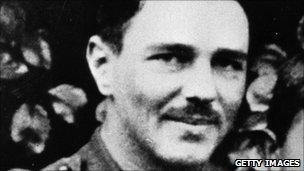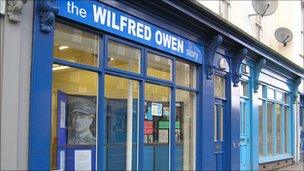Museum opens in Birkenhead for war poet Wilfred Owen
- Published

World War I poet Wilfred Owen was educated at Birkenhead Institute
A museum commemorating the life of World War I poet Wilfred Owen is to open in Birkenhead.
Owen, educated at Birkenhead Institute, wrote poetry influenced by his experiences in the trenches. He was killed trying to cross a canal a week before the end of the war in 1918.
His best known poem Dulce et Decorum Est, like much of the rest of his work, was published after his death.
The museum on Argyle Street opens on 18 March, 2011.
'A poet of all times'
Dean Johnson, who has set up the museum, says Birkenhead needed a permanent memorial to Owen.
"It was the longest stretch of time that he lived anywhere," he said.
"All the three houses that he lived in are still here.
"Here in Birkenhead, where we've got a huge slice of this incredible poet's life, it goes uncelebrated.
"There are scattered pieces, a stained glass window in the library which is beautiful, there's stuff in the archive centre and the houses, but it's confusing. We needed a dedicated place."
Only four of Owen's poems were published in his lifetime and he was virtually unknown as a poet when he died.

The Wilfred Owen Story exhibition is on Argyle Street in Birkenhead
He enlisted in the British Army in 1915 but the majority of his poetry was written while serving in France between August 1917 and September 1918.
His bleak depiction of life fighting in the trenches grew in popularity after his death. Poet Dylan Thomas called him "a poet of all times, all places, and all wars".
Owen was awarded the Military Cross posthumously for his action in the storming of enemy positions around the village of Joncourt in October 1918.
Former Head of Birkenhead Library, John Baxter who has studied Owen's work says the time he spent at school in the town was where he developed his love of poetry.
"He was at school here from the age of seven to 14. It was at Birkenhead Institute School, where he was a good scholar and enjoyed his years at school, that's where his love of poetry was born.
"If you think that the child is father to the man, then I think the seeds of Wilfred Owen's future literature were sown here in Birkenhead."
In a draft preface to his own work Owen wrote: "This book is not about heroes. English poetry is not yet fit to speak of them.
"Nor is it about deeds, or lands, nor anything about glory, honour, might, majesty, dominion, or power, except War.
"Above all I am not concerned with Poetry. My subject is War, and the pity of War.
"The Poetry is in the pity."